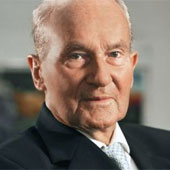The West as a Role Model
What must we still learn to make a dialogue possible that reaches beyond ethnic and territorial borders?
April 19, 2010
We are at a crossroads. Will the next generation's fight for distribution become a "war of cultures," leading to brutal wars and revolts with international consequences?
Or will the experiences of our democratic systems be able to set a common course and create a consensus that enables the peaceful cooperation of different cultures?
But what would the necessary conditions be, exactly? What must we still learn to make a dialogue possible that reaches beyond ethnic and territorial borders?
The people of the world are about to understand that, due to devastating consequences, military action is no alternative to path-breaking political efforts. Politicians and economic leaders try to create a peaceful balance of interests by creating common institutions and international goals. Yet, the status of these efforts is inadequate.
Our future looks grim. International relations are still hindered by expansionist national endeavors and a lack of mutual trust. The responsible parties are still stuck with outdated goals and standards for success and are thus unable to consider pioneering global solutions. The rulers of the world still think that the mightiest will win!
But as long as might and size are what defines success, peaceful cooperation among peoples and cultures will remain a goal of the distant future.
How many more wars do we need to understand that the political distinction of cultures and nations is not tenable? People have to experience that their interests are no longer secured in national units, nor in their fight for political and economic dominance. Our times demand a consolidation of efforts to survive the global struggle for survival.
But if we wish to secure peace and compassion in this global development, we must find an internationally workable order that is based on ethical goals and compassionate action. This order must align an individual's right to dignity and self-determination with the goals of the community and therefore continuously refine the political process.
Pante rhei — all is in flux and no person nor power of the world can suspend the law of constant change! There is justified hope that political constructs carried by one-sided interests will eventually fail, if people can see themselves as global citizens.
If people want to survive, they must show the insight and courage to support the political order that can best do justice to the need for compassion and freedom. Democracy is the only form that allows people to impact their own future. Although it is fraught with faults and needs refinement and completion (just like everything else that is man-made), there is no real alternative to the democratic political order.
If we want to convince other cultures and political orders that democracy is the way to the future, then it is entirely up to us — the citizens of the Western democracies — to ascertain, refine and support the sociopolitical opportunities in our lives. Persuading is not self-righteousness!
An effective role model is far more persuasive: A compassionate, peaceful and economically successful community, which engages in trustworthy dialogue that seeks cooperation and consensus and which offers representatives of different cultures the chance to incorporate their experiences in the political process.
There is no doubt that one of the most difficult political tasks is to revise and develop social systems. A hierarchical understanding of politics cannot manage that. We are at the beginning of a learning curve with still equal amounts of opportunities and dangers. But fear, justified or not, should never tempt us to support solutions that do not serve human nature.
Where people meet, conflicts of interest are unavoidable. But it is up to us to decide whether conflicts turn into fights, whether bridges are built, or gaps are widened, separating us further from other cultures.
Without the constant effort to revise our democratic systems in cooperation with different cultures, we cannot succeed in the global fight for injustice, freedom and humanity.
Editor’s Note: This feature is adapted from A GLOBAL LESSON by Reinhard Mohn, published by Crown Publishers. Copyright 2009 Reinhard Mohn. Reprinted with permission of the publisher.
Takeaways
Our future looks grim. International relations are still hindered by expansionist national endeavors.
We must find an internationally workable order that is based on ethical goals and compassionate action.
This order must align an individual's right to dignity and self-determination with the goals of the community.
